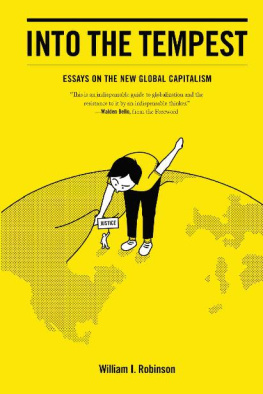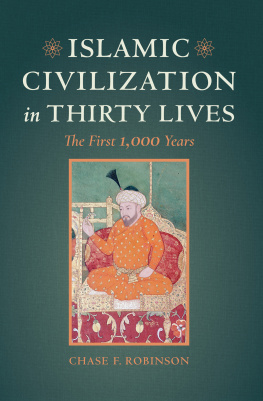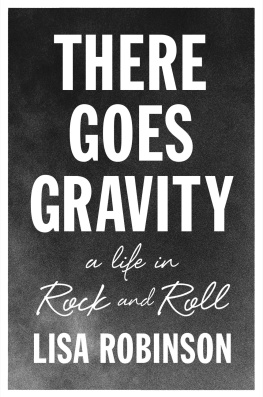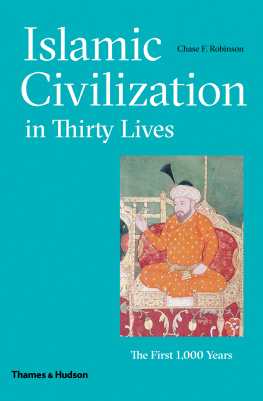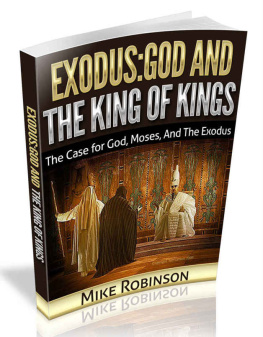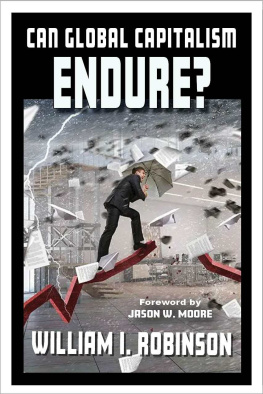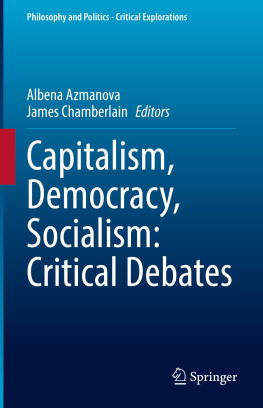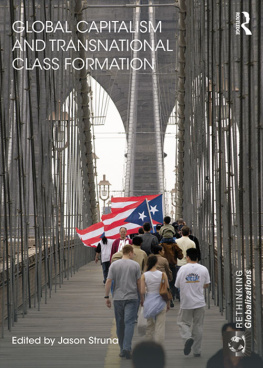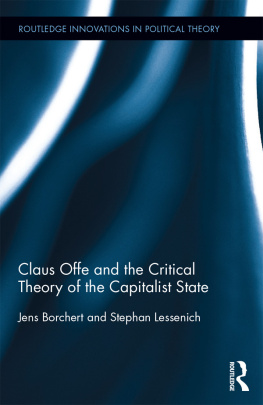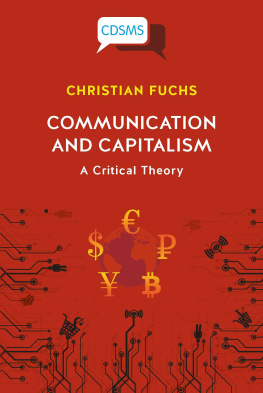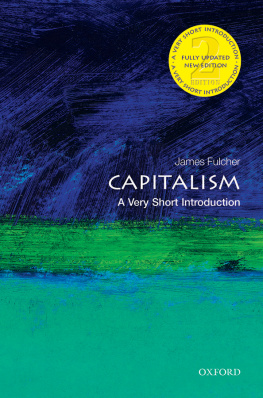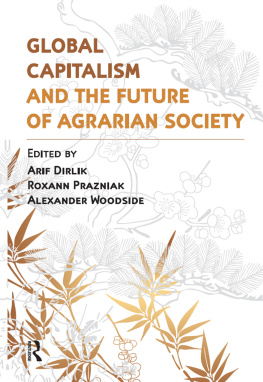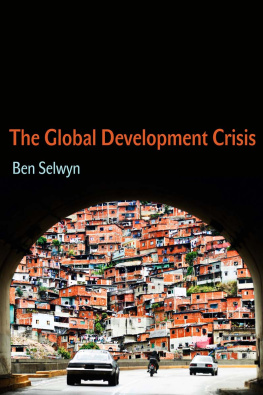Praise for INTO THE TEMPEST
This book is a treasury of big-picture insight from our leading theorist of the emerging system of global capitalism. Robinsons projectto understand the political economy in order to change itstands as the preeminent successor to Marxs project from an earlier epoch. For readers perplexed about our changing world and apprehensive about its future, here is your primer and call to action.
Paul Raskin, author of Journey to Earthland
William Robinsons Into the Tempest is a timely account of global gentrification. While most scholars concentrate on the city, Professor Robinson covers its global impact that has resulted in environmental destruction, social inequalities, and displacement of billions of people around the world. This has led to forced mass migrations. As in the case of micro-gentrification, society is entering the final stages of inequality accelerating a global collapse of modern civilization. Few realize that the state after gentrification is a Blade Runner worlda dystopian society devoid of human emotion and a collective historical memory.
Rodolfo F. Acua, professor emeritus, Chicana/o Studies Department,
California State University, Northridge
Know your enemy and know yourself is how the iconic Sun Tzu began his famous command. William Robinson offers those engaged in the struggle against global capitalism a remarkable and compelling insight and framework in order to both understand our opponents as well as better grasp the strengths and weaknesses of the oppressed and dispossessed. This is the book for which I have been waiting and I could not put it down.
Bill Fletcher, Jr., former president of TransAfrica Forum;
coauthor of Solidarity Divided, and author of Theyre Bankrupting Us:
And Twenty Other Myths About Unions
Into the Tempest challenges us to look at the big picture, to examine without blinders the dramatic changes that have reshaped twenty-first-century capitalism and led to a true crisis of human civilization. Without flinching, it goes on to present theoretical and political analyses that help inform our quest for strategic clarity as we fight for a different world.
Max Elbaum, author of Revolution in the Air:
Sixties Radicals Turn to Lenin, Mao and Che
Robinson has by now accumulated an extraordinary mix of knowledges about global capitalism. Having worked in very diverse areas of the world, he brings to it a kind of wisdom, and this enables the reader to grasp the breadth of instances of the global in todays world.
Saskia Sassen, Columbia University, author of Expulsions
Robinsons brilliant and courageous research has culminated in this pathfinding work of political reconnaissance that traces capitalisms virulent history, exposes its contradictions, locates its capacity to reorganize and digitally reconfigure itself as the fulcrum upon which the survival of the transnational ruling elite rests, and presents an alternative social logic and transgressive strategies for transcending the proliferation of injustices wrought by the existing social order. A masterpiece!
Peter McLaren, distinguished professor in critical studies,
Chapman University; chair professor, Northeast Normal University, China
Robinsons Into the Tempest is a collection of his essays on the emergence of a global police state and the nature of twenty-first-century fascism. It applies a trenchant structural analysis of the world system with a Gramscian effort to theorize and mobilize liberatory social movements that challenge the reactionary forces emerging during the contemporary period of crisis. Robinson is one of the best macrosociologists of his generation. His comparative and temporally deep perspective drives a synthesis of global capitalism and world-system perspectives in a way that allows us to see through the fog of globalization.
Chris Chase-Dunn, University of California, Riverside
PRAISE FOR GLOBAL CAPITALISM AND THE CRISIS OF HUMANITY:
In this thoughtful and informative study, William I. Robinson carries forward the theory of global capitalism that he has presented in earlier works, applying it to the severe crises of an unprecedented moment of human history when decisions directly affect the prospects for decent survival. The perspective that he develops is a most valuable one, broadly researched and carefully analyzed, addressing issues of utmost importance.
Noam Chomsky
INTO THE TEMPEST
ESSAYS ON THE NEW GLOBAL CAPITALISM
WILLIAM I. ROBINSON

2018 William I. Robinson
Published in 2018 by
Haymarket Books
P.O. Box 180165
Chicago, IL 60618
773-583-7884
www.haymarketbooks.org
ISBN: 978-1-60846-967-3
Trade distribution:
In the US, Consortium Book Sales and Distribution, www.cbsd.com
In Canada, Publishers Group Canada, www.pgcbooks.ca
In the UK, Turnaround Publisher Services, www.turnaround-uk.com
All other countries, Ingram Publisher Services International,
This book was published with the generous support of Lannan Foundation and Wallace Action Fund.
Special discounts are available for bulk purchases by organizations and institutions.
Please call 773-583-7884 or email for more information.
Cover design by Ricky Chan.
Library of Congress Cataloging-in-Publication data is available.
10 9 8 7 6 5 4 3 2 1
Printed in Canada

Educate yourselves because we will need all your intelligence.
Be excited because we will need all your enthusiasm.
Organize because we will need all your strength.
Antonio Gramsci
CONTENTS
by Walden Bello
FOREWORD
During the First Ministerial Conference of the World Trade Organization in Singapore in 1996, representatives of the International Monetary Fund, World Bank, various corporations, and the governments of the North toasted the WTO as the jewel in the crown of multilateralism and the cutting edge of the high tide of globalization that was then sweeping the world. It had barely been seven years since the socialist governments of Eastern Europe and the Soviet Union had collapsed, and there no longer seemed to be any significant barriers remaining to the creation of a borderless world integrated by global capital. There was an air of triumphalism, as speaker after speaker proclaimed that removing the barriers to trade, investment, and finance would bring about the best of all possible worlds by allowing the market to work its magic to bring about prosperity for all.
They were wrong.
Barely a year later, a massive financial crisis swept East Asia, putting the world on notice that financial liberalization was not the force for good that Wall Street had trumpeted. Then in December 1999, the collapse of the WTO Third Ministerial Conference in Seattle opened the ears of even neoclassical economists like Jeffrey Sachs and Joseph Stiglitz to the voices of globalizations critics that free trade, structural adjustment, and other neoliberal policies were leading in the opposite direction from what its partisans claimed. But it took the 2008 global financial crisis that ravaged the economies of the Global North to convince most people in the United States and Europe of a truth people in the Global South had been shouting from the rooftops for years: globalization was leading to greater crises and insecurity for the vast majority of people on the planet and threatened the planet itself.
Next page
